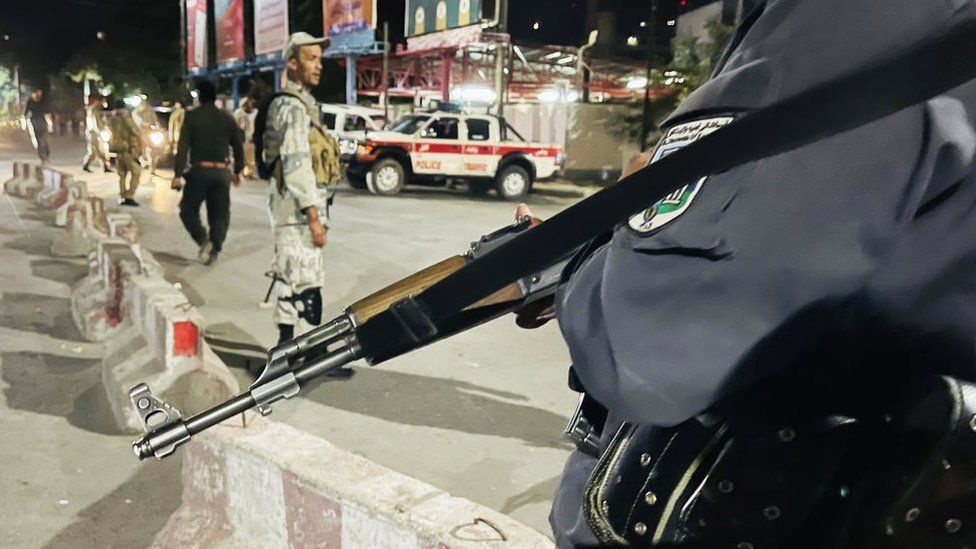AN audacious attack on the Afghan defence minister’s house in Kabul has left at least eight dead, the first major bombing by militants in the city for nearly a year.
Bismillah Khan Mohammadi was not at home on Tuesday night as gunmen detonated a car bomb and fired shots near the heavily fortified Green Zone.
His family was evacuated and four of the gunmen killed, officials said.
The Taliban said they were behind the attack.
The group also warned of more attacks against government leaders. It comes as fighting rages in other cities after foreign troops left the country.
The UN Security Council has called for an immediate end to the violence.
More than 20 other people were reportedly wounded in the incident.
Police say four of the five attackers were also killed after they managed to enter the minister’s villa. The interior ministry said it was a suicide bomb attack.
Special forces rushed to the neighbourhood just outside the Green Zone, the heavily fortified enclave where many embassies and government buildings are located. A gun battle lasting more than three hours finally ended the assault.
“Do not worry, everything is fine!” Mr Mohammadi tweeted after the attack.
Hours later, crowds of Kabul residents took to the streets and rooftops to shout Allahu Akbar (God is greatest) in defiance of Taliban attacks, with videos shared on social media.
Similar scenes had been recorded on Monday in the city of Herat, which has also seen heavy fighting in recent days.
The public show of defiance is a key boost to the morale of embattled Afghan security forces, with the militants attempting to wrest control of a number of provincial capitals, the BBC’s Secunder Kermani in Kabul says.
But the attack on the minister’s home shows how the insurgents can strike even at the very heart of the government, our correspondent adds.
What’s happening elsewhere in the country?
Fierce fighting between militants and government forces has continued in the city of Lashkar Gah, the capital of the southern Helmand province, with the UN saying on Tuesday that at least 40 civilians had been killed in the past day.
“There are corpses on the roads. We do not know if they are civilians or the Taliban,” one resident, who is not being named for security reasons, told the BBC Afghan service in an interview on Whatsapp. “Dozens of families have fled their homes and settled near the Helmand river.”
Other terrified locals told the BBC they had seen bodies lying in the streets.
The Afghan army urged civilians to leave the city ahead of a major offensive against the Taliban, the hardline Islamist group that was driven from power by US-led forces 20 years ago. Fighting has been continuing in the city for days, with the militants now in control of almost all of its districts.
The United Nations and other agencies are warning of a worsening humanitarian crisis.
Capturing Lashkar Gah would be of huge symbolic value to the insurgents as they continue their rapid advance after the pullout of foreign forces. Helmand was the centrepiece of the US and British military campaign.
At the weekend, Attaullah Afghan, the head of Helmand provincial council, admitted that fighting seemed to be “getting out of our control”.
The Taliban have made further advances this week, despite Afghan and US warplanes targeting the insurgents.
There are reports that Taliban fighters have taken positions inside homes, shops and the bazaar – people are trapped in their homes while fighting goes on in the streets.
The militants generally warn people via loudspeaker to leave but sometimes they enter houses – locals have just minutes to flee or risk being caught in crossfire as their homes become part of the battlefield.
Elsewhere in the south, Taliban are trying to capture Kandahar, their former stronghold, and clashes have also intensified in the western city of Herat.

